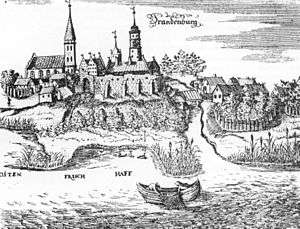Lischke (settlement)

Brandenburg castle and a lischke by Vistula Lagoon
Lischke (lisca, liske[1]) was a type of Old Prussian settlement. Lischkes were spontaneously grown settlements in geographically strategic places, so that often they have grown into towns. Often they grew under the protection of castles. The population was mainly innkeepers, craftsmen and merchants.[2][3]
Etymology
The word entered German language during the invasion of Teutonic Knights into the lands of Old (Baltic) Prussians and is derived from Old Prussian liscis / liskis, which in this context means "camp".[2] The direct meaning of the word, common to Baltic languages, is "nest",[4] and in German the word "Lischke" also retained in the meaning of a basket without wooden handle worn on a cord over shoulder.[2][5]
See also
References
- ↑ in: Georg Heinrich Ferdinand Nesselmann, "Forschungen auf dem Gebiete der Preussischen Sprache", Preussische Provinzial-Blätter, Volume 74 (Google eBook) p. 66
- 1 2 3 Rolf Siemon: Lischke, referring to:
- Ludat, Herbert: Vorstufen und Entstehung des Städtewesens in Osteuropa. Köln-Braunsfeld 1955.
- Weise, Erich (Hrsg.): Handbuch der historischen Stätten: Ost- und Westpreußen. Stuttgart 1966 (unveränderter Nachdruck).
- ↑ Max Töppen, "Über preußische Lischken, Flecken und Städte: Ein Beitrag zur Geschichte der Gemeindeverfassungen in Preußen", in: Altpr. Nachr. IV(1867).
- ↑ ANTANAS KLIMAS, "SOME UNSOLVED RIDDLES OF LITHUANIAN LINGUISTICS", Lituanus, Volume 30, No.1, 1984
- ↑ "Herr" in: Karl Friedrich Wilhelm Wander "Deutsches Sprichwörter-Lexikon", 1867
This article is issued from Wikipedia - version of the 11/3/2016. The text is available under the Creative Commons Attribution/Share Alike but additional terms may apply for the media files.